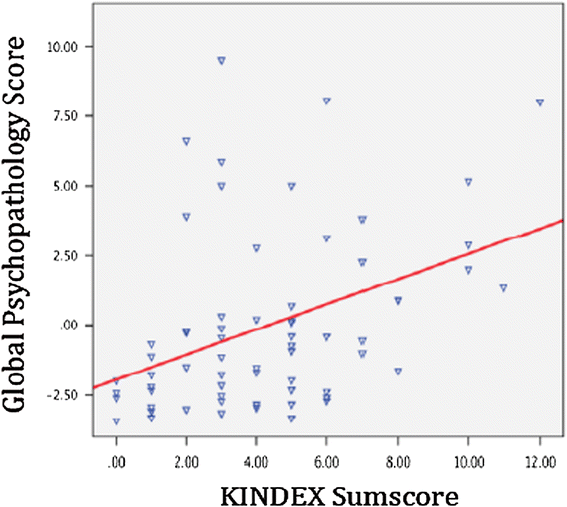Obstetric care providers are able to assess psychosocial risks, identify and refer high-risk pregnant women: validation of a short assessment tool - the KINDEX Greek version
- PMID: 25884996
- PMCID: PMC4343273
- DOI: 10.1186/s12884-015-0462-y
Obstetric care providers are able to assess psychosocial risks, identify and refer high-risk pregnant women: validation of a short assessment tool - the KINDEX Greek version
Abstract
Background: Prenatal assessment for psychosocial risk factors and prevention and intervention is scarce and, in most cases, nonexistent in obstetrical care. In this study we aimed to evaluate if the KINDEX, a short instrument developed in Germany, is a useful tool in the hands of non-trained medical staff, in order to identify and refer women in psychosocial risk to the adequate mental health and social services. We also examined the criterion-related concurrent validity of the tool through a validation interview carried out by an expert clinical psychologist. Our final objective was to achieve the cultural adaptation of the KINDEX Greek Version and to offer a valid tool for the psychosocial risk assessment to the obstetric care providers.
Methods: Two obstetricians and five midwives carried out 93 KINDEX interviews (duration 20 minutes) with pregnant women to assess psychosocial risk factors present during pregnancy. Afterwards they referred women who they identified having two or more psychosocial risk factors to the mental health attention unit of the hospital. During the validation procedure an expert clinical psychologist carried out diagnostic interviews with a randomized subsample of 50 pregnant women based on established diagnostic instruments for stress and psychopathology, like the PSS-14, ESI, PDS, HSCL-25.
Results: Significant correlations between the results obtained through the assessment using the KINDEX and the risk areas of stress, psychopathology and trauma load assessed in the validation interview demonstrate the criterion-related concurrent validity of the KINDEX. The referral accuracy of the medical staff is confirmed through comparisons between pregnant women who have and have not been referred to the mental health attention unit.
Conclusions: Prenatal screenings for psychosocial risks like the KINDEX are feasible in public health settings in Greece. In addition, validity was confirmed in high correlations between the KINDEX results and the results of the validation interviews. The KINDEX Greek version can be considered a valid tool, which can be used by non-trained medical staff providing obstetrical care to identify high-risk women and refer them to adequate mental health and social services. These kind of assessments are indispensable for the promotion of a healthy family environment and child development.
Figures



Similar articles
-
Prenatal screening for psychosocial risks in a high risk-population in Peru using the KINDEX interview.BMC Pregnancy Childbirth. 2016 Jan 22;16:13. doi: 10.1186/s12884-016-0799-x. BMC Pregnancy Childbirth. 2016. PMID: 26801404 Free PMC article.
-
Obstetric care providers assessing psychosocial risk factors during pregnancy: validation of a short screening tool - the KINDEX Spanish Version.Child Adolesc Psychiatry Ment Health. 2014 Dec 23;8(1):30. doi: 10.1186/s13034-014-0030-7. eCollection 2014. Child Adolesc Psychiatry Ment Health. 2014. PMID: 25670965 Free PMC article.
-
Comparing the feasibility, acceptability, clinical-, and cost-effectiveness of mental health e-screening to paper-based screening on the detection of depression, anxiety, and psychosocial risk in pregnant women: a study protocol of a randomized, parallel-group, superiority trial.Trials. 2014 Jan 2;15:3. doi: 10.1186/1745-6215-15-3. Trials. 2014. PMID: 24383441 Free PMC article. Clinical Trial.
-
The developmental psychopathology of perinatal depression: implications for psychosocial treatment development and delivery in pregnancy.Can J Psychiatry. 2012 Sep;57(9):530-6. doi: 10.1177/070674371205700903. Can J Psychiatry. 2012. PMID: 23073030 Review.
-
Conceptualization, measurement, and effects of pregnancy-specific stress: review of research using the original and revised Prenatal Distress Questionnaire.J Behav Med. 2020 Feb;43(1):16-33. doi: 10.1007/s10865-019-00068-7. Epub 2019 Jun 10. J Behav Med. 2020. PMID: 31183596 Review.
Cited by
-
Maternal Childhood Adversity, Prepregnancy Obesity, and Gestational Weight Gain.Am J Prev Med. 2016 Apr;50(4):463-469. doi: 10.1016/j.amepre.2015.08.032. Epub 2015 Nov 7. Am J Prev Med. 2016. PMID: 26558699 Free PMC article.
-
Prenatal screening for psychosocial risks in a high risk-population in Peru using the KINDEX interview.BMC Pregnancy Childbirth. 2016 Jan 22;16:13. doi: 10.1186/s12884-016-0799-x. BMC Pregnancy Childbirth. 2016. PMID: 26801404 Free PMC article.
-
Psychosocial Risk Factors for Child Welfare among Postpartum Mothers with a History of Childhood Maltreatment and Neglect.Geburtshilfe Frauenheilkd. 2016 Mar;76(3):261-267. doi: 10.1055/s-0041-111172. Geburtshilfe Frauenheilkd. 2016. PMID: 27064835 Free PMC article.
-
Obstetric care providers assessing psychosocial risk factors during pregnancy: validation of a short screening tool - the KINDEX Spanish Version.Child Adolesc Psychiatry Ment Health. 2014 Dec 23;8(1):30. doi: 10.1186/s13034-014-0030-7. eCollection 2014. Child Adolesc Psychiatry Ment Health. 2014. PMID: 25670965 Free PMC article.
-
Online narrative exposure therapy for parents of children with neurodevelopmental disabilities suffering from posttraumatic stress symptoms - study protocol of a randomized controlled trial.Eur J Psychotraumatol. 2021 Nov 21;12(1):1991650. doi: 10.1080/20008198.2021.1991650. eCollection 2021. Eur J Psychotraumatol. 2021. PMID: 34868484 Free PMC article. Clinical Trial.
References
-
- Talge NM, Neal C, Glover V. The early stress, translational research and prevention science network: fetal and neonatal experience on child and adolescent mental health: antenatal maternal stress and long-term effects on child neurodevelopment: how and why? J Child Psychol Psychiatry. 2007;48:245–61. doi: 10.1111/j.1469-7610.2006.01714.x. - DOI - PMC - PubMed
Publication types
MeSH terms
LinkOut - more resources
Full Text Sources
Other Literature Sources
Medical
Miscellaneous

